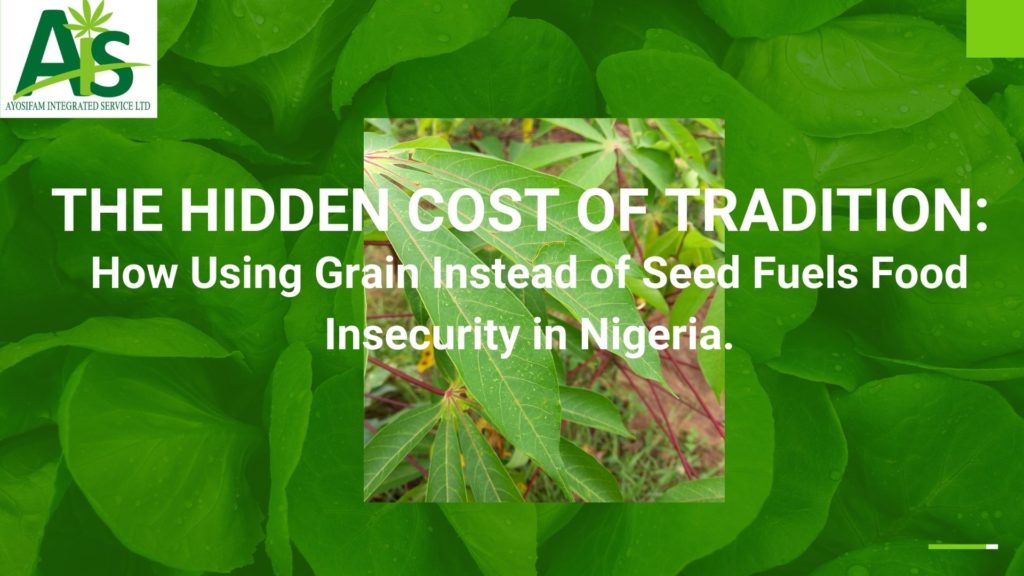In the heartlands of Nigeria, where the rhythmic cycle of planting and harvest dictates livelihoods, a deeply ingrained tradition inadvertently sows the seeds of food insecurity and economic hardship for smallholder farmers. Recent interactions with ten farmers in Kangile, Kwara State, revealed a common practice: the reliance on saved grains from previous harvests for planting, despite acknowledging a key difference – that seeds germinate faster than grain. While seemingly a cost-saving measure, this practice carries significant long-term consequences for both the farmers and the nation’s food systems.
The farmers’ observation about the faster germination of seeds hints at the fundamental distinction between certified seeds and harvested grains. Certified seeds are specifically bred and processed for optimal germination rates, disease resistance, and high yields. They undergo rigorous quality control to ensure genetic purity and freedom from seed-borne pathogens.
On the other hand, grains harvested for consumption are not selected for these traits. They represent a mix of genetic material, potentially including weaker plants and those susceptible to diseases. Replanting these grains leads to several detrimental effects:
Lower Germination Rates and Uneven Growth: As the Kangile farmers themselves noted, grains often exhibit slower and less uniform germination. This results in patchy fields with reduced plant populations, directly impacting the overall yield.
Reduced Yield Potential: Saved grains lack the enhanced genetic traits present in improved seeds, which are specifically developed to produce higher yields under local conditions. Over time, the yield potential of crops planted with saved grains can significantly decline.
Increased Susceptibility to Pests and Diseases: Without the disease resistance bred into certified seeds, crops grown from saved grains are more vulnerable to outbreaks of pests and diseases. This can lead to significant crop losses, further exacerbating food shortages and economic setbacks for farmers.
Loss of Genetic Diversity: The continuous use of saved grains can lead to a narrowing of genetic diversity within local crop varieties. This makes the crops more susceptible to environmental stresses and future disease outbreaks, threatening long-term food security.
Missed Opportunities for Higher Income: The lower yields and potential crop losses associated with using saved grains translate directly into reduced income for farmers. Investing in certified seeds, while an initial cost, has the potential to generate significantly higher returns through increased productivity.
The reluctance of the Kangile farmers to purchase seeds, despite recognizing their superior germination, likely stems from a combination of factors, including:
Cost: The upfront cost of certified seeds can be a significant barrier for smallholder farmers with limited financial resources.
Lack of Awareness: Some farmers may not be fully aware of the long-term benefits of using certified seeds and the hidden costs associated with relying on saved grains.
Traditional Practices: The practice of saving and replanting grains has been a long-standing tradition, and changing deeply ingrained habits can be challenging.
Access and Availability: In some remote areas, access to quality certified seeds may be limited.
However, the continued reliance on saved grains, as highlighted in Kangile, contributes significantly to the persistent issue of food insecurity in Nigeria. Lower yields mean less food available for consumption, both at the household and national levels. This can lead to increased food prices, malnutrition, and a greater reliance on food imports, further straining the national economy.
Furthermore, the economic losses faced by farmers due to reduced yields and crop failures perpetuate a cycle of poverty, hindering their ability to invest in better farming practices and technologies.
Breaking this cycle requires a multi-pronged approach:
Increased Awareness and Education: Educating farmers on the benefits of using certified seeds and the long-term costs of relying on saved grains is crucial.
Improved Access to Affordable Seeds: Government and non-governmental organizations need to work together to ensure that high-quality certified seeds are accessible and affordable for smallholder farmers, perhaps through subsidies or innovative financing mechanisms.
Strengthening Extension Services: Agricultural extension officers can play a vital role in providing farmers with the knowledge and support needed to adopt improved farming practices, including the use of certified seeds.
Promoting Seed Production and Distribution Networks: Investing in local seed production and efficient distribution networks can ensure a sustainable supply of quality seeds.
The reluctance of the Kangile farmers to invest in certified seeds, despite their understanding of the germination advantage, underscores a critical challenge in achieving food security in Nigeria. By recognizing the hidden costs of this tradition and actively promoting the adoption of improved seeds, Nigeria can unlock the true potential of its smallholder farmers and pave the way for a more food-secure and prosperous future.




